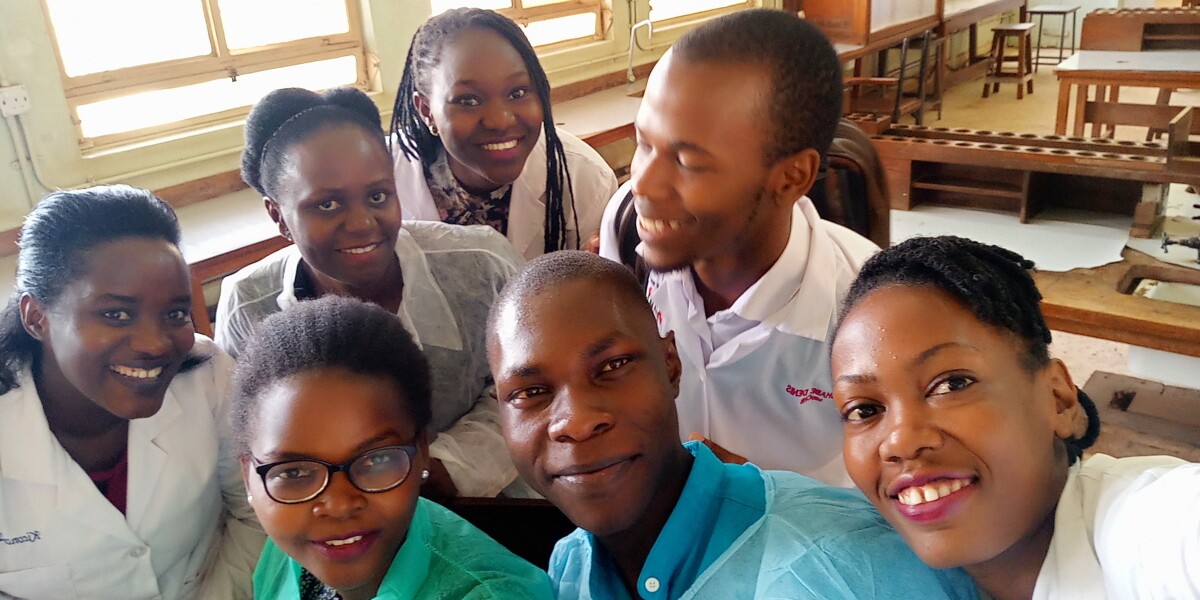A new generation of Immunologists for Africa

The green and warm inviting environment of Makerere University’s College of Health Sciences in Uganda houses the Department of Immunology and Molecular Biology and is home to MSc students in Immunology and Clinical Microbiology. The programme offers graduate training to outstanding non-medical applicants seeking to understand human pathogens and the body’s defence mechanisms. This two-year programme comprises an in-class experience for the 1st year where students get to learn from brilliant faculty and engage through a self-learning lecture experience, moderated by the faculty. In the 2nd year, students undertake research of their choice, learning new laboratory and research-based techniques and experience first-hand the application of the theory they learned in class. A degree in this programme offers one the opportunity to work within health facilities like hospitals and research institutes, the education and public sectors.
Makerere Cambridge Seminar series
The Wednesday afternoon seminar streamed live from Cambridge is always the highlight of the week. The thought of yet again hearing from another world-leader in the immunology field is adrenaline charging! Each semester’s topics are unique, carefully chosen to correlate with the topics covered that semester for both the MSc Immunology and Clinical Microbiology plus the MSc in Bioinformatics classes. Authors of very high impact papers, you had no idea you would ever meet are right in front of you discussing their work that has been a game changer in immunology research. Discussing it in such detail strengthens young researchers’ ability to identify and develop great concepts. The class is always surprised at the level of humility these high-level researchers exhibit. Unfortunately, time always runs out and we leave the room quite sad that next Wednesday is too far away but at the same time excited about the newly sparked off ideas.
The course has transformed us into enthusiastic scientists, equipping us with core Immunological concepts essential for scientific advancement and networking. The COVID-19 pandemic has made us even more resolved to contribute as immunologists. Since graduating, some of us have taught immunology to undergraduate students while also participating in various research projects. We intend to further our scientific careers by pursuing PhDs in immunology. In a nutshell, the MICM course has significantly impacted on our lives through social, economic and professional advancements.
Cambridge-Africa offered to sponsor 12 current or recently graduated Ugandan immunology students to attend The BSI Conference - Connecting Immunology in the time of COVID-19 which took place virtually in December. It was a two-day scientific conference that allowed immunologists from over 31 countries to interact, exchange information and hear from leading UK and international researchers. It assembled leaders in vaccine research across industry, public health sectors and academia. The sessions were very insightful and gave a valuable background of what to expect as we collectively work together towards addressing key issues on COVID-19 and other areas of research.
The bright sparks PhD and Post-Doc sessions had great speakers from different Universities presenting their work. The 8 parallel sessions covered the latest pandemic vaccine approaches, advances in immunotherapy, translating tumour immunology and many other topics. Some of these sessions gave us an insight into the different COVID-19 vaccine candidates and what ‘good’ looks like in terms of efficacy and safety. The disease has highlighted that we cannot look at all sections of the population in the same way, there are differences in terms of sex, ethnicity, comorbidities and most importantly age differences. Understanding the immune response in determining differences in the severity of the disease has been a key issue. The BSI brought the scientific community together to explore some of these questions. The conference highlighted the need for scientists from across the different disciplines to come together, collaborate and move forward. To conclude, it was an interesting, insightful and knowledge rewarding conference that enabled us to interact and share ideas with great researchers. We look forward to attending more of these. We would like to thank Cambridge–Africa for giving us this great opportunity.
Contributors to the Blog: Gift Ahimbisibwe, Martin Ssejjoba, Farouk Segujja, Fortunate Ahumuza, Resty Nabeeta, Lydia Akiteng, Philip Ssekamatte, Brian Nyiro, Beatrice Nassanga, Arthur Kalyebi, Mary Nantongo and Fahad Muwanda

